 BBC News
BBC NewsBorrowing was £17.4bn last month, the second highest October figure since monthly records began in 1993.
Lessons from the Olympic Spirit, Christopher Jackson
It is always a boost to look up from whatever one’s doing to see that the Olympics are just around the corner. That’s the case this year with Paris Olympics – the 131st incarnation of the Games – which begin on 26th July and finish on 11th August. One sees them in the calendar with that same delight with which one sees other rare occasions such as the Football World Cup, or the Ashes.
Their regularity is sufficient to generate familiar feelings of affection, but the gap between Olympiads is never too narrow as to lead to weariness. The Olympics get to anybody who can be gotten to. In being able to do that, they have a way of joining us together.
It is worth noting that most sporting events are of more interest to some countries than others. While there has been a noticeable increase in American interest in soccer these past years, it still isn’t the sport which the country’s premier athletes tend to opt for, preferring the dizzying financial prospects of baseball, basketball and American football. China, perennially second in the medals table at recent Olympiads, has only appeared in one FIFA World Cup in 2002, losing all matches and scoring no goals. Similarly the Cricket World Cups are of interest predominantly to nations of the Commonwealth who were taught under Britain’s transient dominion the undoubted virtues of the sport – but it doesn’t travel much beyond that.
But alongside the sense of international carnival, each Olympiad is also an opportunity to focus in on the host country. We became honorary Brazilians when the Olympics were held in Rio in 2016, and will be honorary Frenchmen this year when the greatest show on earth reaches Paris. Everybody in this country remembers Danny Boyle’s marvellously mad opening ceremony, which celebrated everything from James Bond to the NHS. France, too, has a vast amount to celebrate.
A brief list might include: l’escargots, steak bavette, Claude Monet, the first cathedrals, Les Miserables, the Napoleonic Code, wine and champagne (the latter invented by Benedictine monks), as well as Joan of Arc, Descartes, Pascal, the Tour de France and, if one were inclined to see past that famous headbutt, Zinedine Zidane. That’s quite a lot to be going of as a first draft of an opening ceremony.
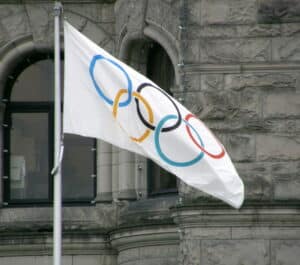
Nevertheless, the global excitement is one of many differentiators between our Olympiad and the ancient games held at Athens. The political situation in Ancient Greece was inevitably provincial compared to ours, but before we feel superior to them, we might remember that sport in those days was part of an integrated vision of life which can shine a light on our somewhat atomised approach. For instance, the Greeks tended to announce political alliances during their games, and one of the greatest poets Pindar wrote predominantly around sporting themes. I know of relatively few good poems about sport – certainly compared to its apparent importance in our lives.
Even so, there is still something marvellous about the way in which the Olympics provides one of our links to the deep past. The Olympics open up onto history and complicated questions about meaning and why we deem tasks to be worth doing at all. Today, sport too often seems to be about more than just who wins and who loses; we have made it limited and reductive when it is actually capable of opening up onto exciting realms of meaning.
But before we broach all that, what makes the Olympics so interesting is that winning and losing seems to mean more at the Olympics than it does anywhere else. There are two reasons for this. One is the occasional nature of the Games, meaning that even a great athlete may only compete in several Olympiads. It is quite possible to be the best athlete in the world at your discipline, and somehow, either due to nerves, injury or bad luck, not get that CV-defining gold medal.
Colin Jackson was perhaps a bit like this – a great hurdler who fell just short. Conversely, it’s possible to be a rank underdog and by some mix of cunning, gumption and adrenalin-fuelled raising of one’s game, win through. Our Olympic long-jumping champion Chris Rutherford is an example of this: I remember vividly in 2012, his own surprise that he had seized a moment which nobody had especially expected to be his.
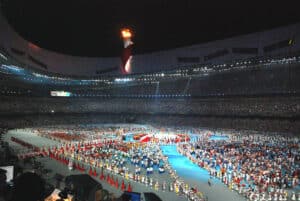
When it comes to the Olympics, such narratives feel enlarged and cannot be replicated in, say, our weekly football matches, where this week’s defeat can be remedied by the following week’s improvement, and even a disappointing season at least cedes, after a brief lag, to the next set of opportunities in a new calendar year.
But the other reason for it all mattering so much is that many of these sports are weird and wonderful and hardly watched at all by the general public in the period between Olympics. It is a rare delight to find one’s interest in, say, equestrian activities, peculiarly re-emerge every four years, and how swiftly one reacquaints oneself with a connoisseur’s eye for dressage.
Every four years I am always interested to mentally re-enter the swimming pool, consider again the plight of the lonely Olympic archer, wonder at the dedication of the weightlifter, feel exhausted as I watched the muscled striving of the rower, and look on with amazement at the life decisions of the top table tennis players. I am therefore thoroughly delighted to see that breakdancing makes its debut at the upcoming Games, and shall be tuning in with particular interest to that.
What makes these quixotic heroes so remarkable is that they have found purpose in activities from which they are unlikely to make much money: this lends a certain purity to their endeavour which feels admirable. It’s incidentally a reason why one never quite buys into the idea of golf or tennis as Olympic sports: we can’t quite believe in Novak Djokovic or Rory McIlroy as feasible visitors to the Olympic village, since they are no doubt en route to their five star hotels.
They may have suffered once for their art, but they have been too amply rewarded since really to qualify in my mind as Olympians. Most athletes partake in the Games strive in the almost certain knowledge that they will never be rewarded. It is the loneliness of the endeavour which gives it its heroism.
Besides, it’s the stories you don’t see which really form the essence of the Olympic experience. I remember sitting in the track and field stadium in East London when the Olympics came to London in 2012. I was watching the heats for the women’s 100 metres. I noticed one athlete – I have never been able to discover her name – who was defeated in her heat, and I found myself reflecting that her entire Olympic experience had lasted just over 10 seconds.
I watched her long walk back to the changing room, already in some way manoeuvred into her post-Olympics life, head bowed and thoughtful. The cameras do not take us there – they need minute by minute drama. A dramatic defeat might make their highlights reel, but not the prosaic ones. Yet to me she had a kind of dignity and decency which made my heart go out to her. She had done what she had to do.
One wonders sometimes about the voices which prompt these athletes to follow these paths. We can only imagine that there is an authentic need here, a wish to take part and belong to something larger than oneself – to strain, to go on a journey of discovery, to compete and to learn to live with defeat or acquire the taste of victory.
I hope that that athlete who lost in qualification may over time have come to reflect that she had much more than that ten second sprint by which to remember her Olympic experience: she could think back with pride on her time of training and the camaraderie that would have entailed; on the excitement of arriving at the Olympic village and the great spirit of mutual joy which pervades it; of the wonder of partaking in the Opening Ceremony; and then, in the experience of defeat, a certain humility and self-knowledge which couldn’t have been arrived at by any other set of experiences.
If we consider that every single one of the athletes at the forthcoming games is embarked on such a journey then perhaps we can enter vicariously into the spirit of the Games with even greater delight.
Even so, the Olympics have down the years bequeathed their particularly memorable dramas, and these all seem to correspond to lessons which we can learn from. Everybody knows that Jesse Owens in 1936 thwarted the racialist ideology of Adolf Hitler when the Games were staged in Berlin. That win reminds us that of the point of competition: our bodies, in their measurable capacities, open up onto reality in a way in which the dark fantasies of dictators do not. This is the health of sport: each discipline is calculable, and the fact of an agreed upon set of rules makes us pay attention and leads us onto truth.
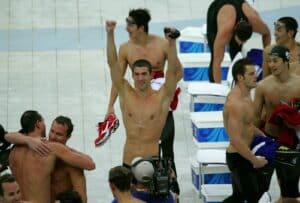
Those who win all teach us something about how we might find something extra in our own lives, no matter what it is we have been called upon to do in our work. I remember the extraordinary career of Michael Phelps who in 2008 broke Mark Spitz’s record by winning 8 gold medals at one Games.
In his seventh win he seemed to be losing in the 100 metre butterfly to Serbia’s Milorad Čavić and somehow in the last stroke made a great lunge forward to win the race by one hundredth of a second. It was a lesson on the very fine margins between success and its antithesis, but also opens up onto the possibility that we may all have something more within ourselves: it is a question of searching – and in this case, having the ability somehow to summon up precisely what you need when you most need it.
Usain Bolt was a different sort of athlete altogether. He made his element pure showmanship, and I doubt any Olympian ever bestowed so much joy per minute. I expect if you totted up all his races across his career, you’d arrive at about five minutes of entertainment. Yet he changed the world because he showed us how to compete without arrogance, yet in celebration at what we’re capable of. There was nothing self-effacing whatsoever about Bolt, but everybody could see his good nature – his delight was never aimed at his rivals in any negative way. Instead, it went outwards with the honest intention of delighting the crowds.
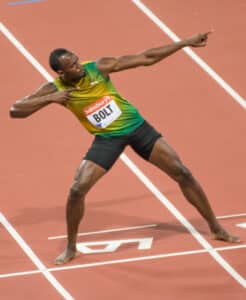
Everybody who comes before us in the Olympics can feel transparent in that way – under the microscope of our collective observation. We feel we know this procession of athletes: Simone Biles with her agility and her occasional lapses into mental fragility; Daley Thompson’s slightly embittered determination; Steven Redgrave’s nearly humourless bloody-mindedness.
Each of these, and so many others, present themselves for our inspection and we can admire their strengths, consider their foibles. Here is success to be reached for with a certain inner uncertainty (Biles), to be grimly and sometimes glumly striven for (Redgrave) or loftily assigned to oneself (Thompson). Personally, I can never get over the straightforward delight of Dame Kelly Holmes as she realises what she’s done in winning the 800 metres in Athens in 2004.
I have written several drafts of this article, and each time when I get to this paragraph I have paused to watch that race, and felt the same tingle when the bell for the last lap rings. Each time, I find myself muttering, “Go on, Kelly” on the final stretch even though I know the result of the race. So much that is precious about the Olympics and humanity is contained in her expression when she sees she’s won: she can’t believe what she’s done as she didn’t know what she was capable of – until she gave it a try.
Despite this, defeat can sometimes be more vivid than victory. Consider, for instance, the story of Derek Redmond who was running in the semi-final of the 400 metres, with a very good chance of a medal should he reach the final. Sadly, he tore his hamstring, but decided to finish the race, evidently in extreme agony. His father came down from the stands to assist him and help him finish.
Nobody who has seen this very moving footage can doubt that there is something here in our own lives which we might emulate. We all go through our lives, vaguely aware that it is in our gift to help each other. But this is an illustration of what help often looks like. I imagine Redmond’s father may briefly have wondered if he was allowed to cross over the stands and help his son, and yet chose to overcome that impediment. It is a reminder that there are always reasons we create for ourselves not to help.
Whenever I watch any montage of Olympic highlights, I start to wonder what it’s about. What is it that makes human being create these disciplines and perfect them? Does it matter if we ever run 100 metres in under 9 seconds? Did it matter that Roger Bannister ran the four minute mile? From one standpoint, it can seem oddly futile – the balls going back and forth; the bodies in their postures; the weights being lifted; the heights being hurdled or vaulted.
And yet there is something good for us about learning to do things well: at our best, it seems that by determined efforts we reach some kind of higher freedom, where we are in some better relationship with natural law. Besides, it is unthinkable to permit a world without play.
It was the great scientist and theologian Emmanuel Swedenborg who said that when the angels play in heaven, they play far harder than we do here. The only right response to the advent of the Paris Olympics is to emulate that.